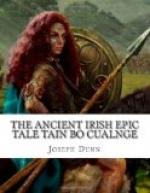[2-2] LU. 24-25.
[b] Right-hand wise, as a sign of a good omen.
[3-3] Stowe.
[4-4] Eg. 1782.
[1-1] Eg. 1782.
[2-2] Eg. 1782.
[3-3] LU. 29.
[4-4] LU. 35-36.
[5-5] LU. 31.
[6-6] Adopting Windisch’s emendation of the text.
As white as snow in one night fallen was the sheen of her skin and her body that shone outside of her dress. Slender and very white were her feet; rosy, even, sharp-round nails she had; [7]two sandals with golden buckles about them.[7] Fair-yellow, long, golden hair she wore; three braids of hair [8]she wore; two tresses were wound[8] around her head; the other tress [9]from behind[9] threw a shadow down on her calves. [10]The maiden carried arms, and two black horses were under her chariot.[10]
[7-7] LU. 29.
[8-8] Eg. 1782.
[9-9] Add.
[10-10] LU. 36.
Medb gazed at her. “And what doest thou here now, O maiden?” asked Medb. “I impart [LL.fo.56a.] to thee thine advantage and good fortune in thy gathering and muster of the four mighty provinces of Erin against the land of Ulster on the Raid for the Kine of Cualnge.” “Wherefore doest thou this for me?” asked Medb. “Much cause have I. A bondmaid ’mid thy people am I.” “Who of [W.220.] my people art thou [1]and what is thy name[1]?” asked Medb. “Not hard, in sooth, to say. The prophetess Fedelm, from the Sid (’the Fairy Mound’) of Cruachan, [2]a poetess of Connacht[2] am I.” [3]"Whence comest thou?” asked Medb. “From Alba, after learning prophetic skill,” the maiden made answer. “Hast thou the form of divination?"[b] “Verily, have I,” the maiden said.[3] [4]"Look, then, for me, how will my undertaking be.” The maiden looked. Then spake Medb:—[4]
[1-1] Eg. 1782.
[2-2] Eg. 1782.
[3-3] LU. 39-41.
[b] Imbass forosna, ‘illumination between the hands.’
[4-4] Eg. 1782.
“Good now,
“Tell, O Fedelm, prophet-maid,
How beholdest thou our host?”
[5]Fedelm answered and spoke:[5]
“Crimson-red from blood
they are;
I behold them bathed in red!”
[5-5] Eg. 1782.
[6]"That is no true augury,"[6] said Medb. “Verily, Conchobar [7]with the Ulstermen[7] is in his ‘Pains’ in Emain; thither fared my messengers [8]and brought me true tidings[8]; naught is there that we need dread from Ulster’s men. But speak truth, O Fedelm:—
“Tell, O Fedelm, prophet-maid,
How beholdest thou our host?”
“Crimson-red from blood
they are;
I behold them bathed in red!”
[6-6] LU. 44.
[7-7] Eg. 1782.
[8-8] Eg. 1782.
[9]"That is no true augury.[9] Cuscraid Mend (’the Stammerer’) of Macha, Conchobar’s son, is in Inis Cuscraid (’Cuscraid’s Isle’) in his ‘Pains.’ Thither fared my messengers; naught need we fear from Ulster’s men. But speak truth, O Fedelm:—




